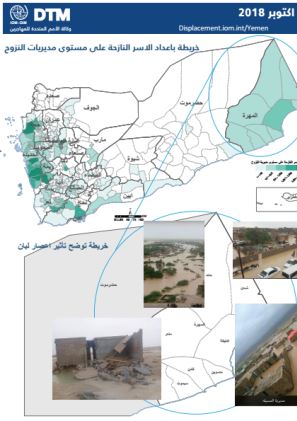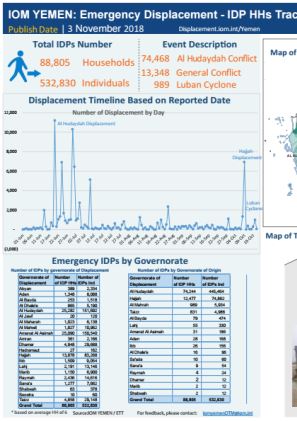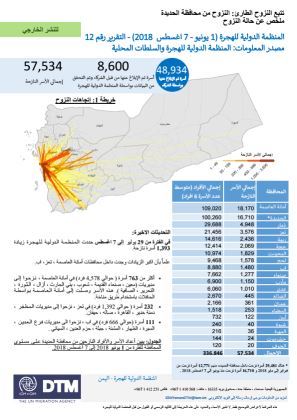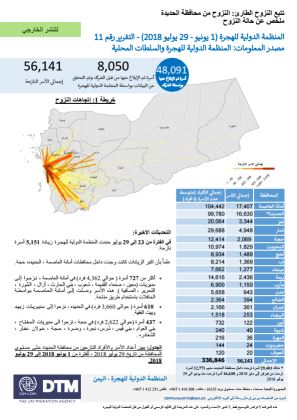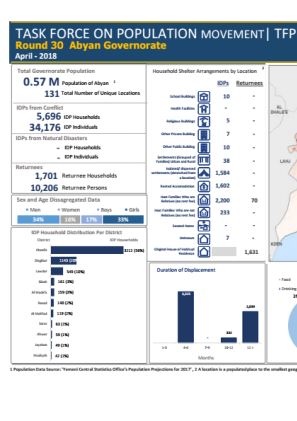-
Countries
-
Data and Analysis
-
Special Focus
-
Crisis Responses
Yemen
IDPs tracked
Displacement Movements
4,516,000
IDMC 2023
Data collection round
About Yemen
Overview
The situation in Yemen has steadily deteriorated as a result of instability and increased fighting between multiple groups. Large scale internal displacement has been observed across the country since the conflict started in 2015. IOM Yemen’s DTM was launched the same year in an effort to better inform the humanitarian community about the location and needs of displaced populations. The DTM identifies both IDP and returnee locations and tracks displacement trends on a daily basis. The DTM also monitors key migrant arrivals and the return of Yemeni migrants mainly in locations across Yemen’s southern coastal border and northern border with the Kingdom of Saudi Arabia (KSA).
Rapid Displacement Tracking (RDT)
As part of the DTM’s mobility tracking, Rapid Displacement Tracking (RDT) primarily tracks IDP and returnee populations throughout Yemen. Information on areas of displacement and return, origins and reasons for displacement, shelter types, and priority needs are collected on a daily basis. RDT data is not representative of all displacements occurring in Yemen due to access constraints in many governorates.
Area Assessment (AA)
The Area Assessment collects stock figures on the number of IDPs, returnees, and migrants, as well as the origins, reasons for displacement, shelter types, and the situation overview at a target location. The Area Assessment data is collected through an extensive key informant network at the smallest geographical area that is operationally possible. This assessment is used to verify and update the baseline information in quarterly cycles, with field staff revisiting and updating information on all previously identified locations populated by IDP and returnee populations.
Flow Monitoring Registry (FMR)
The DTM’s Flow Monitoring Registry (FMR) monitors key third-country migrant arrivals and departures mainly in locations across Yemen’s southern coastal border as well as key Yemeni returns on the northern border with the KSA. Enumerators placed at Flow Monitoring Points (FMPs) record arrivals of migrants and returning Yemeni nationals in order to identify different patterns and types of migration, and to provide quantitative estimates to help define the population of irregular migrants entering the country. FMR is not representative of all flows in Yemen and should be understood only as indicative of the individuals recorded at FMPs during the timeframe indicated. Access constraints limit the ability to collect data at some migrant arrival points.
Multi-Cluster Location Assessment (MCLA)
In order to carry out an evidenced-based needs analysis for the Humanitarian Needs Overview (HNO), and to allow humanitarian partners to make planning decisions, the Yemen Inter-Cluster Coordination Mechanism (ICCM) proposed to carry out a Multi-Cluster Location Assessment (MCLA). This also involves the Technical Working Group (TWG) to formulate planning and implementation processes, as well as data examination and compilation. This assessment is based on the MCLA tool that has been used to assess IDP needs in previous years but has been broadened to include all key population groups that are in need of humanitarian assistance according to the previous HNO. The MCLA will provide nationwide data and evidence-based findings for the HNO to better inform the Humanitarian Response Plan (HRP) in Yemen.
Contact
Current Donors
- Canada
- ECHO
- GFFO
- BHA
Yemen — Emergency Tracking Tool Report 15 (12 November 2018)
IOM uses the Emergency Tracking Tool to compile daily information from various partners including: local and international NGOs, and local and national authorities. Compilation is done through document review, as well as personal and/or phone interviews.
(2018 اليمن — أداة تتبع الطوارئ 14 (3 نوفمبر
Summary pending
Nov 03 2018
(2018 اليمن — أداة تتبع الطوارئ 14 (3 نوفمبر
Yemen — Emergency Displacement Dashboard 2 (3 November 2018)
IOM uses the Emergency Tracking Tool to compile daily information from various partners including: local and international NGOs, and local and national authorities. Compilation is done through document review, as well as personal and/or phone interviews.
Yemen — Weekly Situation Report (30 September —6 October 2018)
IOM Yemen’s weekly Situation Report for the week of 30 September —6 October 2018 highlights that 22.2 million people are in need of humanitarian assistance, while 2 million people are internally displaced.
(اليمن — أداة تتبع الطوارئ 13 (26 سبتمر 2018
التحديثات الاخيرة:في الفترة من 7 أغسطس إلى 26 سبتمبر حددت المنظمة الدولية للهجرة زيادة قدرها 13,355 أسرة نا زحة.علما بأن اكبر الزيادات وجدت داخل محافظات أمانة العاصمة ،الحديده ، تعز.
Oct 07 2018
(اليمن — أداة تتبع الطوارئ 13 (26 سبتمر 2018
Yemen — Emergency Tracking Tool Report 13 (26 September 2018)
IOM uses the Emergency Tracking Tool to compile daily information from various partners including: local and international NGOs, and local and national authorities. Compilation is done through document review, as well as personal and/or phone interviews.
Yemen — Weekly Situation Report (16—22 September 2018)
IOM Yemen’s weekly Situation Report for the week of 16—22 September 2018 highlights that 22.2 million people are in need of humanitarian assistance, while 2 million people are internally displaced.
Yemen — TFPM Report 17 (August 2018)
As of June 2018, the Yemen TFPM estimates 2.3 million Internally Displaced Persons (IDPs), the majority of whom were displaced due to conflict ongoing since March 2015 and dispersed across 22 governorates. Taizz, Hajjah, Amanat al Asimah, Ibb and Amran have the highest recorded displace
Sep 25 2018
Yemen — TFPM Report 17 (August 2018)
Yemen — Weekly Situation Report (26 August —1 September 2018)
IOM Yemen’s weekly Situation Report for the week of 26 August —1 September 2018 highlights that 22.2 million people are in need of humanitarian assistance, while 2 million people are internally displaced.
Yemen — Emergency Displacement Dashboard (1 June — 28 August 2018)
From 1 June to 28 August, IOM Yemen DTM estimates that over 420,000 individuals have experienced rapid onset displacement.
Yemen — Emergency Tracking Tool Report 12 (15 August 2018)
IOM uses the Emergency Tracking Tool to compile daily information from various partners including: local and international NGOs, and local and national authorities. Compilation is done through document review, as well as personal and/or phone interviews.
(اليمن — أداة تتبع الطوارئ 12 (1 يونيو -7 اغسطس 2018
:التحديثات الاخيرة.في الفترة من 29 يوليو إلى 7 اغسطس حددت المنظمة الدولية للهجرة زيادة 1,393 أسرة نازحة.علماً بأن اكبر الزيادات وجدت داخل محافظات أمانة العاصمة ، تعز، اب
Yemen — Weekly Situation Report (22—28 July 2018)
IOM Yemen’s weekly Situation Report for the week of 22—28 July 2018 highlights that 22.2 million people are in need of humanitarian assistance, while 2 million people are internally displaced. Emergency tracking for IDPs displaced by the conflict is continued.
Yemen — Emergency Tracking Tool Report 11 (6 August 2018)
IOM uses the Emergency Tracking Tool to compile daily information from various partners including: local and international NGOs, and local and national authorities. Compilation is done through document review, as well as personal and/or phone interviews.
(اليمن — أداة تتبع الطوارئ ١١ (١ يونيو — ٢٩ يوليو ٢٠١٨
:التحديثات الاخيرةفي الفترة من 23 إلى 29 يوليو حددت المنظمة الدولية للهجرة زيادة 5,151 أسرة.نازحة.علما بأن اكبر الزيادات كانت وجدت داخل محافظات أمانة العاصمة ، الحديده، حجة
(اليمن — أداة تتبع الطوارئ — ١٠ (٣٢ يوليو ٨١٠٢
في الفترة من ١٩ إلى ٢٣ يوليو حددت المنظمة الدولية للهجرة زيادة قدرها 2,883 أسرة نازحة
Jul 25 2018
(اليمن — أداة تتبع الطوارئ — ١٠ (٣٢ يوليو ٨١٠٢
Yemen — Emergency Tracking Tool Report 10 (23 July 2018)
IOM uses the Emergency Tracking Tool to compile daily information from various partners including: local and international NGOs, and local and national authorities. Compilation is done through document review, as well as personal and/or phone interviews.
Yemen — Weekly Situation Report (8—14 July 2018)
IOM Yemen’s weekly Situation Report for the week of 8—14 July 2018 highlights that 22.2 million people are in need of humanitarian assistance, while 2 million people are internally displaced. IOM also conducted Emergency Tracking to monitor displacement from Al Hudaydah.
Jul 22 2018
Yemen — Weekly Situation Report (8—14 July 2018)
Yemen — Weekly Situation Report (17—23 June 2018)
IOM Yemen’s weekly Situation Report for the week of 17—23 June 2018 highlights that 22.2 million people are in need of humanitarian assistance, while 2 million people are internally displaced. IOM also conducted Emergency Tracking to monitor displacement from Al Hudaydah.
Yemen - Abyan Governorate Profile Round 30 (April 2018)
The dashboard contain information on total governorate population, IDP and returnee numbers, demographic data, duration of displacement and needs in eight Yemeni Governorates.
Yemen — Weekly Situation Report (27 May — 2 June 2018)
IOM Yemen’s weekly Situation Report for the week of 27 May – 2 June 2018 highlights that 22.2 million people are in need of humanitarian assistance, while 2 million people are internally displaced. In addition, Since November 2017, IOM identified over 28,000 IDP households through
Yemen — Weekly Situation Report (20—26 May 2018)
IOM is the co-lead of the Task Force on Population Movements (TFPM) and is responsible for tracking IDP and returnee movements across Yemen. IOM’s coastal search and rescue teams for migrants found 117 new arrivals (53 boys and 64 men).
Jun 01 2018
Yemen — Weekly Situation Report (20—26 May 2018)
Yemen — Weekly Situation Report (6—12 May 2018)
IOM is the co-lead of the Task Force on Population Movements (TFPM) and is responsible for tracking IDP and returnee movements across Yemen. IOM’s coastal search and rescue teams for migrants found 313 new arrivals (80 boys and 233 men) in Lahj.
May 17 2018
Yemen — Weekly Situation Report (6—12 May 2018)
Yemen — Weekly Situation Report (29 April — 5 May 2018)
IOM is the co-lead of the Task Force on Population Movements (TFPM) and is responsible for tracking IDP and returnee movements across Yemen.
Pagination
Pagination
- First page
- Previous page
- …
- 8
- 9
- 10
- 11
- 12
- 13
- 14
- 15
- 16



